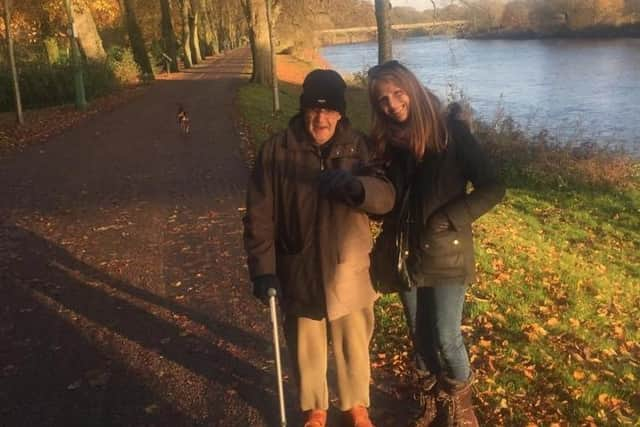"Everything that could go wrong for my dad, did. Everything felt like a battle.”
and live on Freeview channel 276
A bereaved daughter from Preston has spoken up for dementia sufferers and their carers in support of a special awareness week and campaign organised by the Alzheimer's Society.
Brenda Waddington cared for her father who had dementia as long as she could.
Advertisement
Hide AdAdvertisement
Hide AdBut when the Prestonian felt forced to let him go into care following her own health battle it was the beginning of what became a desperate situation for them both.


Her father Eric Huddleston 93, died in hospital last October and the family's experience highlights both pressure points and weaknesses in the care system and the extra pressures of enforced separation due to the pandemic.
She is sharing her experience as part of this week's Alzheimer's Society Dementia Action Week. and the charity's #Cure The Care System campaign.
Eric, a former foreman with Preston Council's parks department, had mixed dementia. Until last June Eric and Brenda lived together in Preston and he attended day centres which she said helped to stimulate him and gave her some valued time to herself.
Advertisement
Hide AdAdvertisement
Hide AdBut when the country went into lockdown in March 2020 Brenda of Penwortham, was left caring for her father for 24 hours a day with no help.
Following a skin cancer operation in June she took the difficult decision for Eric, whose home had been on Sharoe Green Lane, Fulwood, to go into a care home so he could receive the round the clock care he needed.
She said: “Dad had been living on his own until September 2019, but he was struggling and I was having to spend most of my time at his house. He moved in with me and for nine months I cared for him."
The day centres had provided a vital respite for Brenda and the much needed stimulation for Eric. She recalled: "It was hard – it was the hardest job I’ve done in my life – but I could manage just about. When the day centres closed during lockdown, I just felt overwhelmed.”
Advertisement
Hide AdAdvertisement
Hide AdEric was, she recalled, "a very young 93" who only stopped riding his bike when he was 85, and enjoyed socialising and could not abide being alone.
Brenda was not allowed to visit Eric in the care home due to the pandemic restrictions.
She said: "He was quite fit and well really and only needed basic nursing for a malignant melanoma on his scalp but he needed constant stimulus which is why it was so exhausting for me caring for him alone."
She said in the care home her father got more frustrated sitting in his room. She said: “He was climbing the walls and constantly saying he wanted to die. He started to be aggressive towards staff. Dad loved playing games and going out in the garden, but he didn’t have any of that. I asked to come in and help entertain him so I could reassure him but I wasn’t allowed."
Advertisement
Hide AdAdvertisement
Hide AdShe believes the stress and anxiety of having no familiarity and contact with his family worsened his condition: "I only saw him four times between June and October. He felt abandoned.’’
In October Eric was taken to Royal Preston Hospital with a suspected seizure. Brenda said pandemic restrictions again meant she was not allowed to go into the assessment room with him, but was allowed to take him back to the care home in her car.
Two weeks later Eric was taken to hospital again after another episode in the care home. Eric was later admitted to Chorley hospital for assessment where he died. The cause of death was "community acquired pneumonia " and his malignant melanoma (skin cancer).
Brenda said: “I had to battle to be with him in hospital despite explaining to his doctors that he had dementia and needed support. It was really difficult to get through to the ward on the phone. I was desperate to see my dad and reassure him."
Advertisement
Hide AdAdvertisement
Hide AdWhen the hospital range to say he had died Brenda recalled her sorrow at the family not being able to be with him. She said :"I was devastated he had died alone. I asked if my brother and sister could see him after he passed away and they said no. Everything that could go wrong for my dad, did. Everything felt like a battle.”
For more information about the #CureTheCareSystem campaign see alzheimers.org.uk/DAW. For information, advice and support call the Alzheimer’s Society Dementia Connect support line on 0333 150 345 or see the charity's website.
For our report on the #CureThe Care System campaign and the Alzheimer's Society's research into dementia care and hospital admissions see here .
* The Lancashire Post is more reliant than ever on you taking out a digital subscription to support our journalism. For unlimited access to Lancashire news and information online, you can subscribe here.